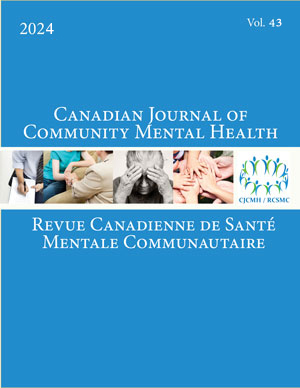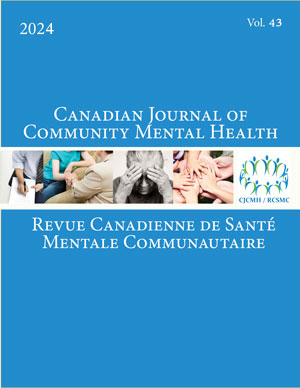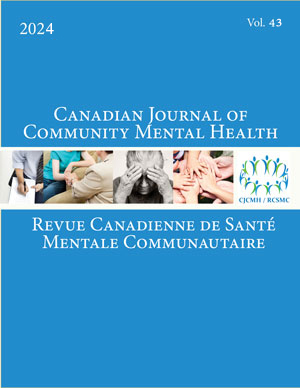Volume 10 • Number 2 • September 1991
OPEN ACCESS
OPEN ACCESS
The purpose of this cross-sectional study was to test the relationship between conjugal support, family coping behaviours, and the well-being of community-dwelling elderly marital partners. A multi-stage sample of 135 couples, 65 years of age and over, was drawn from users and non-users of the health and social systems in a large metropolitan area. A series of questionnaires, presented within an interview format, were used to measure the variables of conjugal support, family coping behaviours, well-being (self-assessed health, life satisfaction, and marital satisfaction), and selected demographic and control variables. Each spouse was separately interviewed at home by a trained interviewer. Stepwise multiple regressions were performed. Results revealed for both husbands and wives, a direct effect and an indirect effect of conjugal support on well-being through cognitive family coping strategies, namely “reframing” and “active appraisal” of the problem. A model linking the major variables is proposed. These findings suggest psychosocial interventions to improve cognitive coping strategies and conjugal support with the ultimate aim of enhancing the quality of life of the increased number of elderly marital partners living in the community.
OPEN ACCESS
Effects of familial social support on three indicators of well-being among elderly rural Manitobans were examined. Social exchange theory predicted interaction with offspring would have no effect on well-being, while being religious, having high income, and good health would have a positive effect. A random sample of 137 respondents was obtained via personal structures interviews. Three indicators of well-being, daily satisfaction, global happiness, and self-esteem were regressed against demographic variables, interaction with offspring, religiosity, income, and health. Results were only partially consistent with social exchange theory. Parental contact with children predicted life satisfaction but was unrelated to global happiness. Religiosity predicted global happiness for both fathers and mothers and satisfaction for fathers. Good health predicted higher satisfaction and global happiness for both fathers and mothers. Income was unrelated to all measures of well-being. Self-esteem was not predicted by any independent variable for mothers or fathers.
OPEN ACCESS
Through an analysis of data from 152 widowed and 62 never-married elderly residents of southern Ontario, this paper examines the relationship between social support and well-being, measured in terms of morale. The data indicate that while perceived social support is related to morale, particularly among the widowed, measures of available support are not directly associated with well-being among the widowed and never-married elderly. Indeed, reliance upon others for support is, in some circumstances, associated with decreased well-being among the elderly.
OPEN ACCESS
Many people suffering from dementia live at home, in spite of the demands that such a situation puts on those who care for them. The role of helper is usually assumed by a particular family member who is therefore more likely to feel the impact of the caregiving responsibility. Researchers are concerned with the relationship between the well-being of these helpers and their informal social support. This article presents a critical review of 21 studies of that relationship. The various dimensions of social support considered in the studies are analyzed, as are the methodological limits. A discussion of findings about the relationships between social support and wellbeing completes the analysis. It appears that researchers have a limited conception of social support and assess only a few of its many dimensions in a variety of ways. Very few authors explicitly specify underlying assumptions or a theory relevant to their conceptualization of social support. The weakness and the diversity of this conceptualization are reflected in the measurement tools which consist of a few ad hoc questions on social support in nearly 50% of the studies. Few studies consider the support availability, duration, conflict, and reciprocity. The buffering effect model of support is examined in one study. Inadequate sample size, unrepresentative samples, and lack of control in regard to confounding variables are among the methodological problems identified. When researchers use an evaluative approach to measure social support, the relationships between support and well-being are more often significant than when a descriptive approach is used. In future studies, researchers should be careful to better articulate the theoretical notions proposed in studies on caring for a family member with dementia at home with those coming from studies on social support in general. It is important for researchers to strengthen their study design and to carry out longitudinal studies; they must also try to understand how the influence of society works. From this perspective, one avenue for the future might involve studying the sequence of relationships between stress, support, coping strategies, and well-being. This is all the more important because at the present time certain studies on the caring of persons with dementia are based on a conceptual framework of stress. Such a framework considers support as a mediating factor.
OPEN ACCESS
Previous research has cited the need for leisure education programs to ensure that leisure-time experiences serve to enhance elderly individuals' psychological well-being. This study sought to determine the effects of a leisure education program on perceived leisure control, perceived leisure competence, and self-esteem among elderly patients in a day hospital. Fifty-three volunteer participants were randomly assigned to experimental and control group conditions. The experimental group received a leisure education program which occurred one hour per week for eight weeks. Both groups were administered a test battery, before and after the program, to assess the impact of the leisure education program on the dependent variables locus of control, perceived competence, and self-esteem while controlling for possible intervening variables. The results of an analysis of covariance for perceived leisure competence were statistically significant. The findings for the other dependent variables, leisure locus of control and self-esteem, were not significant. The implications of these results for researchers and the delivery of leisure services in day hospitals are discussed.
OPEN ACCESS
Studies of the health and family situation of natural caregivers of the mentally ill do not indicate the gender of the principal caregiver. Consequently, they do not provide details about the health or the social support networks of women, who, in general, are the ones who assume the caregiving role. The purpose of this study of 61 female natural caregivers living with mentally ill patients was to describe the state of health of these natural caregivers as well as their social support from both neighbours and professionals. Another purpose was to verify the existence of relationships among these variables. Four health variables are studied: emotional distress, well-being, perception of general health, and number of health problems. Support from both neighbours and professionals is examined from the point of view of the caregivers' needs and the satisfaction felt by the caregivers, and according to several functions of social support, Descriptive analyses show that at least half of the natural caregivers suffer from emotional distress, diminished well-being, and various health problems. When support from neighbours is considered, the caregivers express numerous needs; two thirds of the caregivers declare themselves satisfied except in regard to their need to socialize. Regarding professional support, caregivers express fewer needs and seem less satisfied by the support received. Regression analyses demonstrate that two of the four predictors of neighbour support contribute significantly, though modestly, to the variations in emotional distress; one of those predictors also contributes to variations in the perception of general health. No significant relation was found for professional support. Recommendations are made for future research and for preventive interventions with women who are natural caregivers.
OPEN ACCESS
This study examined two issues related to the transition from informal to formal support sources of support: (a) the link between losses within the social network and a transition in source of support, and (b) the association between transitions toward formal sources of support and changes in wellbeing. Included were a subset of community-dwelling elders who participated in the Aging in Manitoba Studies and who survived over a 12-year follow up (n = 384). Women, but not men, experienced a transition to formal support with the less of a spouse or housemate, or with recent relocation to a new community. Moreover, for some women, the shift toward formal support was associated with declines in well-being, but this was true for only one of several measures of well-being. Thus, little evidence was found to suggest that the transition from informal to formal support has a detrimental effect on elders' levels of well-being.
OPEN ACCESS
This paper integrates two major domains of gerontological research, namely, social support and reminiscence, within the conceptual framework of social resources. It reviews the health benefits of informal social support in the elderly and then examines the social support functions of group reminiscence. Although the literature on the social support benefits of group reminiscence is very scanty, available data show it is an effective means of expanding social resources and facilitating socialization, which are essential to the mental health of the aging population.










